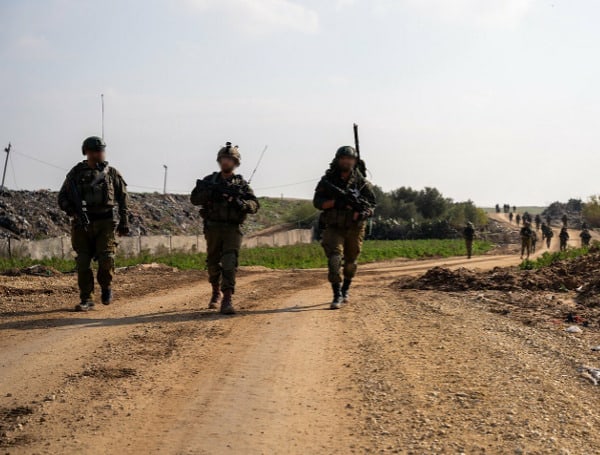Russian Deputy Foreign Minister Mikhail Bogdanov criticized the Israel Defense Force’s (IDF) ground operation in southern Lebanon during an October 1 meeting with Lebanese Ambassador Shawki Bou Nassar.
Bogdanov expressed Russia’s “strong condemnation” of Israel’s actions, including alleged political assassinations, and emphasized the need for humanitarian aid to Lebanon and the safe evacuation of Russian citizens.
Meanwhile, Russian officials have called for an immediate ceasefire in the Middle East.
READ: Russia Reportedly Collaborating With China To Develop Attack Drones For Use In Ukraine
Russian Foreign Minister Sergei Lavrov met with Arab ambassadors to discuss the conflict, urging a halt to military operations in the Israeli-Palestinian region.
Additionally, Russia appears to be leveraging the Middle East crisis to further its influence in global geopolitics.
Deputy Foreign Minister Sergei Ryabkov announced that Palestinian Authority President Mahmoud Abbas has accepted an invitation to attend the upcoming BRICS summit in Kazan, scheduled for October 22–24, where the situation in the Middle East will be discussed.
The Russian Ministry of Foreign Affairs (MFA) also condemned Israel’s recent actions, including the “political assassination” of Hezbollah Secretary General Sayyed Hassan Nasrallah and Israeli strikes against Iranian targets.
EVACUATION
The Israeli military on Thursday called for the immediate evacuation of residents from over 20 towns in southern Lebanon, including the provincial capital Nabatieh, as it continued its ground incursion against Hezbollah. This action follows Israel’s most significant military losses in a year while fighting the Iran-backed militant group.
The evacuation warning signals a potentially broader Israeli operation aimed at further weakening Hezbollah, which has escalated its rocket attacks on Israeli civilian and military targets since the conflict between Israel and Hamas in Gaza began nearly a year ago.
READ: Iran’s Missile Attack Tried To Overwhelm Air Israeli Defenses, Israel Prepares To Hit Back
In a two-wave assault on October 2, Hezbollah launched multiple rockets at Israeli forces near Avivim and claimed attacks on Haifa and various military posts along the Israel-Lebanon border.
Iran’s Largest Attack on Israel Prompts Israeli, U.S. Retaliation Threats
Earlier in the week, Iran launched its largest missile assault on Israel to date, in what it described as retaliation for the assassination of senior Hezbollah and Hamas leaders, as well as Israeli military operations in Gaza and Lebanon. Tehran, however, signaled it would refrain from further attacks unless provoked, while Israeli and U.S. leaders vowed swift retaliation. Israeli Prime Minister Benjamin Netanyahu declared that Iran had “made a big mistake” and that it would “pay for it.”
RELATED: U.S. Navy Destroyers Intercept Iranian Ballistic Missiles In Defense Of Israel: CENTCOM
U.S. National Security Adviser Jake Sullivan called the missile attack a “significant escalation” but confirmed that many of the missiles were intercepted by U.S. and Israeli defense systems. Despite these efforts, some missiles caused damage to civilian areas and military installations, including near Tel Aviv and the Negev Desert.
Regional Allies Join the Conflict
Iran’s allies in the region, including Yemen’s Houthis and various Iraqi militias, have also joined the conflict, launching missile and drone attacks against Israeli targets. The Houthis claimed responsibility for an attack on Tel Aviv using drones, while Iranian-backed militias in Iraq threatened to target U.S. forces if they supported Israeli retaliatory measures against Iran.
In Lebanon, Israel is also bracing for possible larger-scale ground incursions by Hezbollah, which has reportedly deployed 3,000 Iranian-backed fighters, including members of the elite Radwan special operations forces. These fighters are allegedly preparing for a coordinated ground assault on Israeli positions, adding a new layer of complexity to the already volatile conflict.
READ: Florida Sen. Rick Scott: U.S. Must Hold Iran Accountable For Attacks On Israel
As the conflict continues to escalate, Israeli officials are reportedly planning “significant retaliation” against Iran, targeting Iranian military infrastructure or conducting high-profile assassinations. The Israeli military is also considering strikes on Iran’s nuclear facilities if further attacks occur.
Iran has warned that any retaliatory actions by Israel will lead to even larger strikes, threatening to target critical Israeli infrastructure. The conflict, which began as part of Israel’s ongoing battle with Hamas, now risks evolving into a broader regional war involving major global powers.
The situation remains highly fluid, with both sides preparing for further escalations as the fighting intensifies along the Israel-Lebanon border and beyond.
Please make a small donation to the Tampa Free Press to help sustain independent journalism. Your contribution enables us to continue delivering high-quality, local, and national news coverage.
Android Users: Download our free app to stay up-to-date on the latest news.
Connect with us: Follow the Tampa Free Press on Facebook and Twitter for breaking news and updates.
Sign up: Subscribe to our free newsletter for a curated selection of top stories delivered straight to your inbox.

